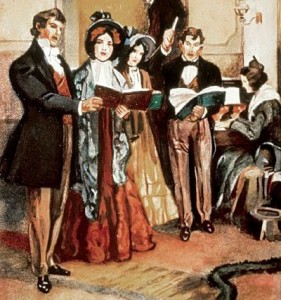Good Ol’ Boys Melt Down Easy
Mamacita says:
After we read a story about colors, I once gave my 8th graders Pantone swatches and told them to find their skintone. Big shocker: nobody was white and nobody was black. The students were genuinely surprised and loved this. (Fancy words for simple colors abounding!) A few parents were furious, the good ol’ boy principal melted down, and this is one of many files in my personnel folder that I am very proud of. (It’s very easy to make a good ol’ boy melt down. )

Quotation Saturday: Special New Year 2021 Edition

Every Saturday: Quotations to feed your soul.
Mamacita says: For this first Quotation Saturday of 2021, here are some quotes about the New Year:
1. It depends on us. Another year lies before us like an unwritten page, an unspent coin, an unwalked road. What pages will be read, what treasures will be gained in exchange for time, or what we find along the way, will largely depend on us. –Esther Baldwin York
2. Every New Year is the direct descendant, isn’t it, of a long line of proven criminals? –Ogden Nash
3. I will seek elegance rather than luxury, refinement rather than fashion. I will seek to be worthy more than respectable, wealthy and not rich. I will study hard, think quietly, talk gently, act frankly. I will listen to stars and birds, babes and sages, with an open heart. I will bear all things cheerfully, do all things bravely, await occasions, and hurry never. In a word, I will let the spiritual, unbidden, and unconscious grow up through the common. –William Ellery Channing
4. We spend January 1 walking through our lives, room by room, drawing up a list of work to be done, cracks to be patched. Maybe this year, to balance the list, we ought to walk through the rooms of our lives, not looking for flaws, but for potential. –Ellen Goodman
5. New year, same goal. –Joe King
6. The new year begins in a snow-storm of white vows. –George William Curtis
7. Happiness is too many things these days for anyone to wish it on anyone lightly. So let’s just wish each other a bileless New Year and leave it at that. –Judith Crist
8. No one ever regarded the First of January with indifference. It is that from which all date their time, and count upon what is left. It is the nativity of our common Adam. –Charles Lamb
9. New Year’s Eve, where auld acquaintance be forgot. Unless, of course, those tests come back positive. –Jay Leno
10. Drop the last year into the silent limbo of the past. Let it go, for it was imperfect, and thank God that it can go. –Brooks Atkinson
11. I made no resolutions for the New Year. The habit of making plans, of criticizing, sanctioning, and molding my life, is too much of a daily event for me. –Anais Nin
12. New Year’s is a harmless annual institution, of no particular use to anybody save as a scapegoat for promiscuous drunks, and friendly calls and humbug resolutions. –Mark Twain
13. Every man regards his own life as the New Year’s Eve of time. –Jean Paul Richter
14. An optimist stays up until midnight to see the new year in. A pessimist stays up to make sure the old year leaves. –Bill Vaughn
15. New Year’s Resolution: To tolerate fools more gladly, provided this does not encourage them to take up more of my time. –James Agate
16. New Year’s eve is like every other night; there is no pause in the march of the universe, no breathless moment of silence among created things that the passage of another twelve months may be noted; and yet no man has quite the same thoughts this evening that come with the coming of darkness on other nights. –Hamilton Wright Mabie
17. People are so worried about what they eat between Christmas and New Year, but they really should be worried about what they eat between the New Year and Christmas. –Unknown
18. New Year’s Day – Now is the accepted time to make your regular annual good resolutions. Next week you can begin paving hell with them as usual. –Mark Twain
19. Year’s end is neither an end nor a beginning, but a going on, with all the wisdom that experience can instill in us. –Hal Borland
20. The Old Year has gone. Let the dead past bury its own dead. The New Year has taken possession of the clock of time. All hail the duties and possibilities of the coming twelve months! –Edward Payson Powell
21. Cheers to a New Year and another chance for us to get it right. –Oprah Winfrey
22. We will open the book. Its pages are blank. We are going to put words on them ourselves. The book is called Opportunity and its first chapter is New Year’s Day. –Edith Lovejoy Pierce
23. The object of a New Year is not that we should have a new year. It is that we should have a new soul and a new nose; new feet, a new backbone, new ears, and new eyes. Unless a particular man made New Year resolutions, he would make no resolutions. Unless a man starts afresh about things, he will certainly do nothing effective. –G.K. Chesterton
24. Good resolutions are simply checks that men draw on a bank where they have no account. –Oscar Wilde
25. Be always at war with your vices, at peace with your neighbors, and let each new year find you a better man. –Benjamin Franklin
26. Many people look forward to the new year for a new start on old habits. –Unknown
27. Youth is when you’re allowed to stay up late on New Year’s Eve. Middle age is when you’re forced to. –Bill Vaughn
28. The only way to spend New Year’s Eve is either quietly with friends or in a brothel. Otherwise when the evening ends and people pair off, someone is bound to be left in tears. –W.H. Auden
29. It wouldn’t be New Year’s if I didn’t have regrets. –William Thomas
30. Time has no divisions to mark its passage, there is never a thunder-storm or blare of trumpets to announce the beginning of a new month or year. Even when a new century begins it is only we mortals who ring bells and fire off pistols. –Thomas Mann
31. One resolution I have made, and try always to keep, is this: To rise above the little things. –John Burroughs
32. From New Year’s on the outlook brightens; good humor lost in a mood of failure returns. I resolve to stop complaining. –Leonard Bernstein
33. Let this coming year be better than all the others. Vow to do some of the things you’ve always wanted to do but couldn’t find the time. Call up a forgotten friend. Drop an old grudge, and replace it with some pleasant memories. Vow not to make a promise you don’t think you can keep. Walk tall, and smile more. You’ll look ten years younger. Don’t be afraid to say, ‘I love you’. Say it again. They are the sweetest words in the world. –Ann Landers
34. Surely, it is much easier to respect a man who has always had respect, than to respect a man who we know was last year no better than ourselves, and will be no better next year. –Samuel Johnson
35. No, life has not disappointed me. On the contrary, I find it truer, more desirable and mysterious every year ever since the day when the great liberator came to me: the idea that life could be an experiment of the seeker for knowledge and not a duty, not a calamity, not trickery. –Friedrich Nietzche
36. It is difficult not to believe that the next year will be better than the old one! And this illusion is not wrong. Future is always good, no matter what happens. It will always give us what we need and what we want in secret. It will always bless us with right gifts. Thus in a deeper sense our belief in the New Year cannot deceive us. –Kersti Bergroth
37. I feel that you are justified in looking into the future with true assurance, because you have a mode of living in which we find the joy of life and the joy of work harmoniously combined. Added to this is the spirit of ambition which pervades your very being, and seems to make the day’s work like a happy child at play. –Albert Einstein
38. Making resolutions is a cleansing ritual of self assessment and repentance that demands personal honesty and, ultimately, reinforces humility. Breaking them is part of the cycle. –Eric Zorn
39. In the New Year, may your right hand always be stretched out in friendship, never in want. –Old Irish toast
40. For last year’s words belong to last year’s language and next year’s words await another voice. –T.S. Eliot
41. A New Year’s resolution is something that goes in one year and out the other. –Unknown
42. As you go through your week, month, and even New Year, recognize the people who have packed your parachute and enabled you to get where you are today. –Unknown
43. Everybody has difficult years, but a lot of times the difficult years end up being the greatest years of your whole entire life, if you survive them. –Brittany Murphy
44. For last year’s words belong to last year’s language, and next year’s words await another voice, and to make an end is to make a beginning. –T.S. Eliot
45. The New Year, like an Infant Heir to the whole world, was waited for, with welcomes, presents, and rejoicings. –Charles Dickens
46. Write it on your heart that every day is the best day in the year. –Ralph Waldo Emerson
47. But can one still make resolutions when one is over forty? I live according to twenty-year-old habits.– Andre Gide
48. A weasel comes to say “Happy New Year” to the chickens. –Chinese proverb
49. Life is a challenge; meet it! Life is a dream; realize it! Life is a game; play it! Life is Love; enjoy it! –Sri Sathya Sai Baba
50. I’m always excited about the new year. Every time I make it to another birthday, it’s a good deal. –Bruce Kinzie
Happy New Year, my friends.
Happy New Year To You All!

Mamacita says: Happy New Year, dear friends, both seen and unseen, both here and elsewhere. Happy New Year to you all.
I’ve been blogging for almost 17 years now. I’ve made many new friends, some of whom I’ve met in real life. However, and I’ve said this before but that doesn’t prevent me from saying it again, my blogosphere friends I’ve never actually met are just as real to me as if they lived next door. Bloggers have redefined “real life.” There are many different levels of real life now, and they’re all real.
I hope all of you have a wonderful and positive New Year. I hope nothing bad happens to any of you, and I hope you are all safe, and healthy, and happy, every single day. You, and everybody who is precious to you.
Ah, the New Year’s song. . . .This song always makes me tear up. Even back before I knew what it meant, something about it was both sad, and happy, and sentimental. Harry Burns tried  to explain it to Sally Albright, but his explanation was more desperation than fact. Robert Burns could be like that. Remember, you’ve quoted a line from his poem about a louse crawling on a woman’s hair all your adult life: “O wad some Power the giftie gie us, To see oursels as ithers see us!” (You do NOT need that translated, right?) I thought not.
to explain it to Sally Albright, but his explanation was more desperation than fact. Robert Burns could be like that. Remember, you’ve quoted a line from his poem about a louse crawling on a woman’s hair all your adult life: “O wad some Power the giftie gie us, To see oursels as ithers see us!” (You do NOT need that translated, right?) I thought not.

Harry and Sally at the New Year’s party
Here is Robert Burns’ (no relation to Harry Burns) most famous poem. It was set to music years later. (traditional folk melody.)
Should auld acquaintance be forgot, (Should old acquaintances be forgotten,)
And never brought to mind (And never remembered?)
Should auld acquaintance be forgot,
And the days of auld lang syne. (And days of long ago.)
And surely ye ‘ll be your pint’ stowp (And surely you will pay for your pint)
And surely I ‘ll be mine (And surely I’ll pay for mine)
And we ‘ll take a cup o’ kindness yet (We’ll drink a cup of kindness yet) (booze)
 For auld lang syne (for the days of long ago.)
For auld lang syne (for the days of long ago.)
We twa hae run about the braes (We two have run around the hillsides)
And pou’d the gowans fine (and pulled the daisies fine)
But we ‘ve wander’d monie a weary fit (But we have wandered many a weary foot)
Sin’ auld lang syne. (Since the days of long ago.)
We twa hae paidl’d in the burn (We two have paddled in the stream)

The old year passes and the new year begins. . . .
Frae morning sun till dine (From noon ‘till dinner time)
But seas between us braid hae roar’d (But seas between us broad have roared)
Sin’ the days of auld lang syne (Since the days of long ago)
And there’s a hand, my trusty fiere (And there’s a hand, my trusty friend)
And gie ‘s a hand o’ thine (And give us a hand of yours)
And we ‘ll tak a right guid-willie waught (And we will take a goodwill draught)(that means, take a drink together)
 For auld lang syne (For the days of long ago)
For auld lang syne (For the days of long ago)
[CHORUS]For auld lang syne, my dear (For the days of long ago, my dear)
For auld lang syne (For the days of long ago)
We’ll tak a cup o’ kindness yet (We’ll take a cup of kindness yet) (booze)
For auld lang syne (For the days of long ago.)
To answer the question of whether or not old acquaintances should ever be forgotten, the answer is, most emphatically, “NO.”
Not till the Alzheimer’s makes me say “Oh Baby” to the nursing home orderlies.
I love you, dear friends. And I wish you were all here so we could take a right guid willie waught together. I’m really up for some good willie waught.

All hail the duties and possibilities of the coming twelve months! ~Edward Payson Powell






